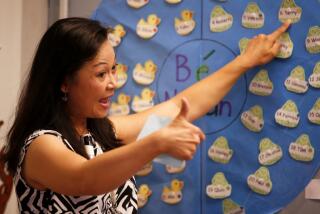Teachers Say Mentors, Networking Would Help Them Most
- Share via
Few U.S. teachers report getting a chance to participate in the types of professional development that teachers deem most helpful, according to a report released by the U.S. Department of Education.
Although almost all teachers regularly engage in efforts to improve their performance, only one in 20 of those surveyed said they had a mentor they turned to weekly for advice, and only 6% had weekly contact with a “network” of colleagues in similar job assignments.
Yet those activities were among those most valued by teachers who participated in them, with between 80% and 90% saying the experiences improved their performance “a lot.”
The report, based on a 1998 national survey of more than 4,000 full-time teachers, is part of a broad federal response to concerns over the quality of teaching in America. The report compiled data on teachers’ educational backgrounds, professional development activities and feelings about their skills.
Only one in five teachers said they felt “very well prepared” to utilize technology in their classrooms. A similarly low percentage of teachers said they were fully prepared to teach their students who were not fluent in English or who were disabled in some way.
Regarding professional development, the report found that most teachers continue to work in isolation in their classrooms, although most have attended a one-day workshop or conference on a particular topic within the past year.
But previous research has found that such activities are unlikely to produce changes in how teachers teach or students learn. And the teachers’ responses reinforced those findings.
“Teachers are telling us the kinds of support that they need and want--more peer collaboration, team teaching, common planning periods,” said U.S. Education Secretary Richard W. Riley. “If we don’t listen to them, we will shortchange our children and our teachers by hanging onto comfortable but self-defeating practices.”
In another disturbing finding, the survey revealed a mismatch between professional development and the needs of students. While 54% of the teachers reported having students who were not fluent in English and 71% said they had pupils with disabilities, few of the instructors engaged in professional development targeted to their needs.
Judy Johnson, who helps teachers network as part of her work with the Los Angeles Educational Partnership, said the importance of ongoing professional development is well-known. But, she said, schools are resistant to change.
Too often, she said, professional development is done “in ways that are disjointed, unfocused and occasional.” One-time workshops on Saturdays or after school may be fine for communicating information, but they rarely cause teachers to change what they do in classrooms.
By contrast, the most effective professional development involves teachers “watching and helping each other on a particular strategy,” such as how to teach reading.
Jane Fung, a primary-grade teacher at Los Angeles’ White House Place School in mid-Wilshire, said that when she began teaching a dozen years ago, she attended every weekend workshop she could. Now, she and several younger teachers whom she mentors at her school meet regularly after school to talk about topics such as how to use state academic standards in their classrooms.
“It’s social, there’s support, and if there’s a problem with how to handle a student, there’s six or seven of us and we can all brainstorm together,” she said. “We do it for free, so we must like it.”
Diana Takenaga-Taga, who teaches kindergarten at the Windsor Hills Math-Science-Aerospace Magnet School, said she’s trying to organize similar meetings for the science teachers at her school. They have been meeting monthly, and she hopes that will increase.
“I hear more and more people saying, ‘We don’t want one-shot workshops because it’s a waste of our time,’ ” she said.
“Teacher Quality: A Report on the Preparation and Qualifications of Public School Teachers” is available from the National Center for Education Statistics. The report is on the Internet at https://www.ed.gov/Speeches/990128.html.
More to Read
Sign up for Essential California
The most important California stories and recommendations in your inbox every morning.
You may occasionally receive promotional content from the Los Angeles Times.













